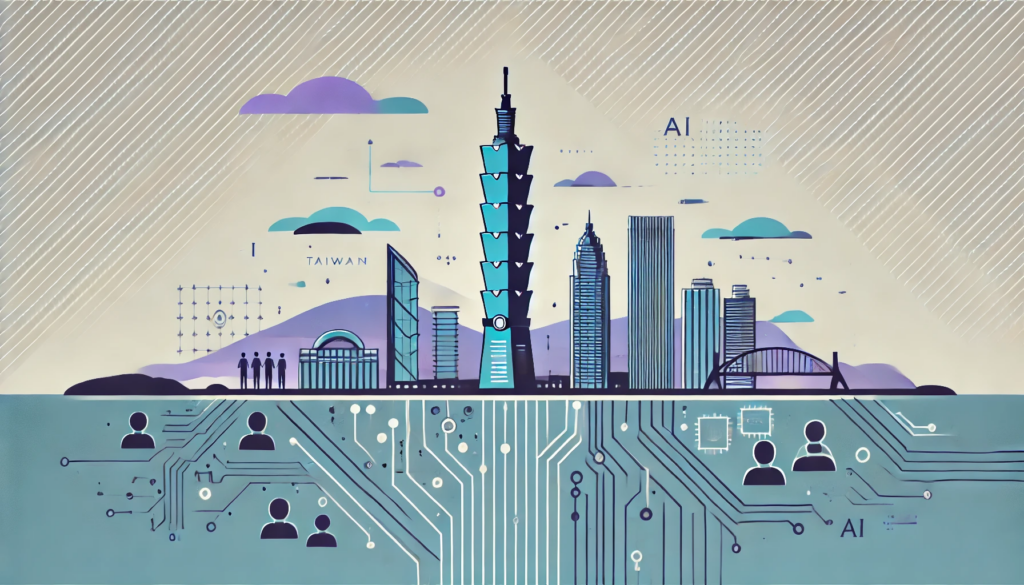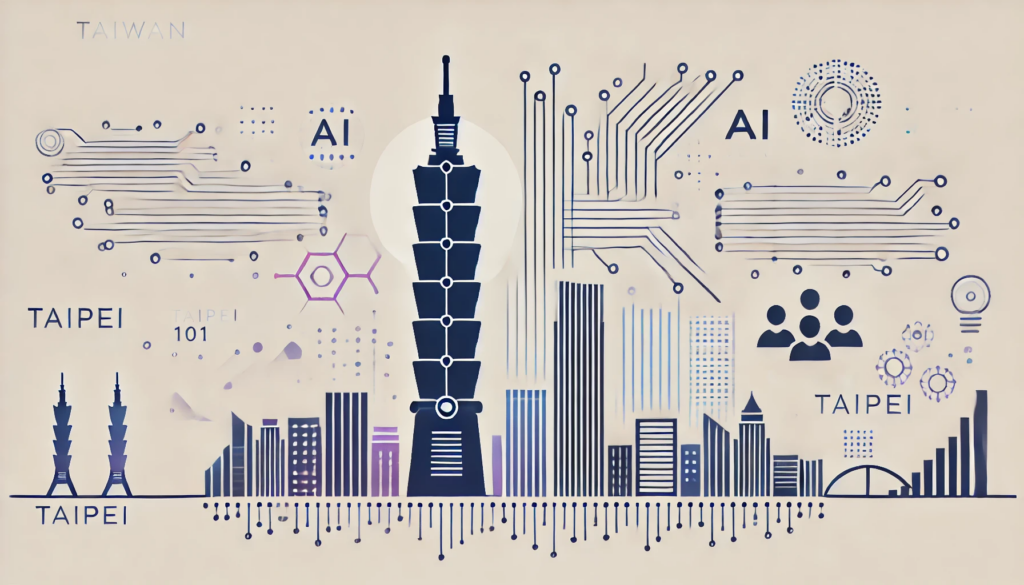
ChatGPT:
Below is a high-level business plan outline for establishing an AI-focused incubator in Taiwan. The plan begins with an analysis of Taiwan’s AI ecosystem—its strengths, challenges, and opportunities—and then moves into the core elements required to launch and operate a successful incubator.
- Executive Summary
• Vision: Create a leading AI incubator in Taiwan that nurtures early-stage ventures, bridges academia and industry, and propels Taiwan to become a regional AI innovation hub.
• Mission: Provide robust mentorship, funding, technical resources, and industry connections to AI startups, accelerating their growth from ideation to market validation. - Overview of Taiwan’s AI Ecosystem
2.1 Government Initiatives & Policy Support
• Taiwan AI Action Plan: The government’s focus on emerging technologies includes AI, big data, robotics, and IoT. Subsidies or grants may be available for AI R&D.
• Industrial Technology Research Institute (ITRI): Offers collaboration opportunities, specialized labs, and commercialization support.
• National AI Labs: Initiatives like Taiwan AI Labs demonstrate the government’s commitment to AI development, fostering cooperation between public and private sectors.
2.2 Academic and Research Strengths
• Strong University System: Top institutions (e.g., National Taiwan University, National Tsing Hua University, National Chiao Tung University) have established AI labs and produce a steady talent pipeline in computer science, data science, and engineering.
• Collaboration Potential: Universities increasingly encourage spin-offs and technology transfer—an ideal source of incubator deal flow.
2.3 Established Tech Industry
• Semiconductor Leadership: Taiwan’s semiconductor giants (TSMC, MediaTek) provide hardware innovation advantages and potential partnerships for AI hardware-related startups (e.g., edge AI).
• Hardware-Manufacturing Ecosystem: AI startups that need rapid prototyping or hardware-software integration can leverage a well-developed supply chain (Foxconn, Pegatron, etc.).
2.4 Market Challenges
• Talent Competition: AI talent is in high demand globally. Taiwanese startups may need to compete with multinational firms for skilled engineers and researchers.
• Limited Domestic Market Size: Taiwan’s consumer market, while advanced, is relatively small. Startups often need a global go-to-market strategy or niche B2B channels to scale.
• Language & Cultural Barriers: Expanding globally may require bridging cultural gaps, particularly when entering English-speaking or other major Asian markets.
2.5 Opportunities
• Regional Gateway: Taiwan’s geographic and cultural proximity to China and Southeast Asia could position it as a regional hub for AI solutions.
• Public-Private Synergy: Government incentives plus established tech infrastructure create an environment where an AI-centric incubator can thrive.
• Smart Manufacturing & Healthcare: Taiwan’s strengths in advanced manufacturing and public-health systems make these prime verticals for AI innovation.
- Incubator Value Proposition
- AI-Specific Resources: Provide startups with specialized AI tools, GPU computing clusters, and technical mentorship from domain experts.
- Bridging Academia & Industry: Facilitate partnerships with universities for research collaboration, while connecting startups to major tech firms for pilot programs.
- Access to Capital: Offer seed funding (directly or via affiliated venture funds), as well as connections to angel networks and VCs focusing on deep tech.
- Regional & Global Reach: Leverage Taiwan’s position to help startups scale internationally, tapping into markets in Asia, North America, and beyond.
- Incubator Structure & Program Details
4.1 Program Phases
• Phase 1: Ideation & Validation (3–4 months)
• Focus on refining AI use-cases and conducting market research.
• Workshops on data collection, model feasibility, and rapid prototyping.
• Intensive mentorship to ensure teams tackle real-world problems.
• Phase 2: Product Development & Pilot Projects (3–6 months)
• Assign technical mentors from academia or industry (e.g., TSMC, Foxconn) to guide model optimization, data engineering, and hardware integration if needed.
• Offer specialized labs or resources (GPU credits, HPC clusters) at discounted rates or free.
• Align pilot projects with corporate partners or government bodies to validate solutions in real use-cases.
• Phase 3: Go-to-Market & Fundraising (2–3 months)
• Sales and marketing guidance, with an emphasis on building global-ready products.
• Demo Days and pitch events with pre-vetted investors.
• Follow-on funding support, connecting startups to local and international VCs.
4.2 Facilities & Services
• Physical Workspace: Offices and co-working spaces in Taipei or Hsinchu (close to university/industry clusters).
• Shared Labs: Access to specialized AI hardware, testbeds for robotics or IoT, data science software licenses, and private sandbox environments for regulated industries (e.g., healthcare data).
• Administrative Support: Legal, accounting, and HR advice tailored to AI startups, including data privacy compliance and patent strategies.
4.3 Mentorship & Advisory Board
• Technical Mentors: Senior ML engineers, data scientists, or professors from leading Taiwanese universities.
• Business Mentors: Experienced founders, corporate partners in manufacturing or healthcare, and marketing experts to guide commercialization strategies.
• Global Advisory Panel: Invite overseas AI experts and entrepreneurs to offer perspective on scaling beyond Taiwan.
- Operational Model & Funding Strategy
5.1 Incubator Ownership & Partnerships
• Public-Private Partnership: Potential co-funding from government programs (e.g., National Development Council) and corporate sponsorship.
• University Links: Formal partnerships with NTU, NTHU, NCTU, etc., to source R&D projects and interns.
• Venture Capital Alliances: Collaboration with AI-focused VCs or corporate venture arms for seed investments and follow-on rounds.
5.2 Revenue Streams
1. Equity Stakes: Take a small equity percentage (e.g., 5–7%) from each incubated startup, aligned with seed investments or “services for equity” models.
2. Grants & Subsidies: Leverage government innovation funds, research grants, or public-private matching programs.
3. Corporate Sponsorship: Allow corporate partners to sponsor AI challenges, pilot projects, or specialized labs.
4. Program Fees (if applicable): Minimal or no fees for initial stages, ensuring the incubator remains founder-friendly. Some advanced cohorts may carry a nominal fee for specialized services.
5.3 Sustainability & Growth
• Real Estate Strategy: Potential to expand to multiple innovation hubs (Taipei, Hsinchu, Taichung) as the program grows.
• Corporate Partnerships: Additional revenue from hosting custom AI hackathons or co-branded events with large enterprises.
• Scale Internationally: Form partnerships with incubators in Singapore, Japan, or Silicon Valley for cross-border exchange programs.
- Marketing & Recruitment
- University Roadshows: Present at computer science, engineering, and MBA programs, encouraging AI-minded students to apply.
- Industry Conferences: Host or sponsor AI-related events (e.g., Computex, AI Summit) to connect with potential startups and corporate partners.
- Online Presence: Maintain a well-curated website and active social media channels showcasing success stories, mentor profiles, and application guidelines.
- Local Media & Tech Press: Collaborate with Taiwanese tech media (e.g., TechOrange, Business Next) and global outlets to highlight the incubator’s achievements and alumni.
- Implementation Timeline (Example)
- Month 1–3:
• Finalize partnerships with universities and government agencies.
• Set up incubator facility (select location, sign lease, equip labs).
• Announce program launch and begin accepting applications. - Month 4–6:
• Host initial AI pitch competition or hackathon to attract top talent.
• Select first cohort (targeting ~10–15 startups).
• Establish formal mentorship relationships and finalize staff hires. - Month 7–9:
• Begin Phase 1 (Ideation & Validation).
• Introduce workshops on AI fundamentals, product-market fit, and pitch refinement.
• Engage corporate partners for pilot program discussions. - Month 10–12:
• Progress to Phase 2 (Product Development & Pilot Projects).
• Host mid-program review and networking event.
• Invite potential investors to track progress. - Month 13–15:
• Conduct Phase 3 (Go-to-Market & Fundraising).
• Organize Demo Day; facilitate investor meetings.
• Evaluate first cohort outcomes, refine process for next intake.
- Month 1–3:
- Risk Management & Challenges
- Talent Retention: Prevent brain drain by offering competitive compensation, robust mentorship, and global exposure for startups.
- Ensuring Quality: Maintain strict selection criteria to admit AI-focused teams with credible tech or research backgrounds.
- Global Competition: Differentiate from other Asian AI hubs (e.g., Singapore, Shenzhen) by emphasizing Taiwan’s hardware prowess, advanced manufacturing ecosystem, and close ties to top universities.
- Regulatory Barriers: Address data-privacy laws and sector-specific regulations (healthcare, fintech), possibly partnering with legal experts to navigate these issues.
- Conclusion
A specialized AI incubator in Taiwan can thrive by leveraging the country’s robust tech infrastructure, world-class semiconductor industry, and strong academic foundations. By offering technical resources, mentorship, funding, and industry partnerships, such an incubator would empower AI startups to innovate rapidly and scale globally. Through a well-structured program, close ties to universities, and continued government and corporate support, the incubator can become a cornerstone of Taiwan’s emerging reputation as a critical node in the global AI landscape.

Below is a multi-pronged promotional strategy for an AI-focused incubator in Taiwan, detailing how to reach and engage the core audiences: AI entrepreneurs, technical talent, investors, corporate partners, universities, and the broader tech community.
- University and Academia Outreach
- Campus Roadshows and Hackathons
• Host informational sessions, technical workshops, and hackathons at top universities (e.g., NTU, NTHU, NCTU).
• Offer incentives like mentorship hours or internship opportunities for winning teams, thereby attracting motivated student founders. - Research Collaborations
• Formalize partnerships with university AI labs or professors, providing a clear path for research spin-offs.
• Sponsor departmental events or thesis showcases in computer science and engineering disciplines to build rapport with up-and-coming innovators. - Entrepreneurship Clubs and Student Groups
• Engage with existing campus-based entrepreneurial clubs or AI societies.
• Invite them to incubator tours, demo days, and speaker sessions, building early awareness and interest.
- Campus Roadshows and Hackathons
- Tech and Startup Community Engagement
- Local Tech Meetups & Conferences
• Host or sponsor meetups targeting AI, data science, machine learning, and robotics enthusiasts.
• Leverage established events like Meet Taipei, Computex, or specialized AI summits to run panels or workshops.
• Showcase incubator alumni or mentors as speakers, highlighting real success stories. - Online Communities & Social Media
• Maintain an active presence on platforms like Facebook, LinkedIn, and LINE (popular in Taiwan) to share milestones, program highlights, and success stories.
• Encourage alumni founders to share experiences, forming a virtual “alumni ambassador” network to attract new applicants. - Local Startup Hubs and Coworking Spaces
• Partner with coworking spaces in Taipei (e.g., CLBC, Futureward), Taichung, or Hsinchu, to host info sessions, pitch nights, and AI-themed workshops.
• Cross-promote events to tap into existing entrepreneurial communities.
- Local Tech Meetups & Conferences
- Strategic Corporate Partnerships
- AI Demo Days for Corporates
• Invite corporate innovation teams from semiconductor, electronics, or manufacturing giants (e.g., TSMC, Foxconn) to exclusive demo days.
• Position the incubator as a scouting pipeline for novel AI solutions that can integrate with corporate R&D projects. - Joint R&D or Pilot Programs
• Collaborate with large enterprises or government-backed organizations (like ITRI) to develop pilot programs.
• Showcase these pilots in case studies or white papers, enhancing credibility and attracting more corporate partners. - Sponsorship Packages
• Offer tiered sponsorship opportunities where companies can subsidize some incubator costs in return for branding, early access to portfolio companies, or data-sharing partnerships.
- AI Demo Days for Corporates
- Public Relations and Media Outreach
- Local Media
• Engage tech-focused outlets such as Business Next, TechOrange, or Digitimes to feature incubator news and success stories.
• Send press releases announcing new cohorts, partnership deals, or major funding wins. - Global Tech Media
• For high-impact AI startups, pitch to publications like TechCrunch, VentureBeat, or AI-specific blogs to highlight Taiwan’s emerging AI ecosystem on the global stage.
• Position the incubator as the gateway for regional expansion into Asia, drawing attention from overseas AI talent and investors. - Success Stories and Human Interest Angles
• Emphasize the personal journey of founders, the real-world problems they’re solving, and the incubator’s role.
• Such narratives often garner broader mainstream coverage, beyond strictly tech media.
- Local Media
- Collaborations with Government and Industry Bodies
- Government-Funded Events
• Align with Taiwan’s Ministry of Science and Technology or the National Development Council to co-host AI innovation fairs or pitch competitions.
• Apply for grants under Taiwan’s AI Action Plan for partial funding, increasing the incubator’s visibility and legitimacy. - Industry Associations
• Partner with associations (e.g., Taipei Computer Association, TAITRA) to gain access to their membership base.
• Attend or sponsor trade shows they organize, promoting the incubator’s offerings to a wide professional audience.
- Government-Funded Events
- Global Connectivity
- Partnerships with International Incubators
• Build exchange programs with AI or deep-tech hubs in Singapore, Japan, or Silicon Valley.
• Offer cross-border networking events, encouraging overseas startups to consider Taiwan for manufacturing or pilot testing, thereby enriching the incubator’s international appeal. - International Pitch Competitions
• Send top Taiwan-based AI teams to global challenges (e.g., Slush, Tech in Asia) under the incubator’s banner.
• Publicize any wins or placements as proof of the incubator’s quality. - Multilingual Content
• Maintain an English-language website and marketing materials to attract non-Taiwanese talent and investors.
• Include Chinese and English in social media updates, event announcements, and press releases to bridge local and global audiences.
- Partnerships with International Incubators
- Mentorship and Thought Leadership
- High-Profile Mentor Network
• Publicize AI experts, seasoned entrepreneurs, and academics who serve as mentors.
• Highlight their credentials and success stories, showing the depth of guidance available. - Educational Content & Webinars
• Organize free or low-cost webinars on AI fundamentals, data labeling best practices, edge computing, etc.
• Use these sessions as lead-generation tools and a platform to showcase the incubator’s expertise. - Thought Leadership Articles
• Encourage mentors or program directors to contribute articles to tech publications on AI trends, Taiwan’s innovation landscape, or success cases from the incubator.
• Position the incubator as the go-to resource for AI insights in Taiwan.
- High-Profile Mentor Network
- Community Building and Engagement
- Monthly Meet-and-Greets
• Host casual networking events to foster a sense of community among applicants, mentors, investors, and alumni.
• Focus on knowledge sharing and success stories, cultivating a welcoming environment for those considering AI ventures. - Open-Door Policy
• Offer “office hours” where aspiring founders or curious partners can visit, tour the facilities, and talk to the incubation team.
• This accessibility helps build trust and visibility in the local tech ecosystem. - Alumni Ambassador Program
• Encourage successful graduates to become ambassadors who share their journey, mentor newer teams, and represent the incubator at external events.
• Alumni endorsements often resonate strongly with prospective applicants and partners.
- Monthly Meet-and-Greets
- Measuring Success
- Application Volume & Quality
• Track the number and caliber of startup applications per cohort, focusing on increased AI relevance and diversity of technology solutions. - Media Mentions & Online Engagement
• Monitor press coverage, social media followers, newsletter open rates, and event RSVPs.
• Consistent upward trends indicate growing brand awareness. - Partnership Deals
• Quantify the number of corporate collaborations, government grants, and international partnerships formed. - Cohort Outcomes
• Follow startup performance: funding raised, pilot programs initiated, product launches, and eventual exits. This data further validates and promotes the incubator’s brand.
- Application Volume & Quality
Final Thoughts
By combining academic outreach, community-driven marketing, strategic corporate and government partnerships, and strong media engagement, an AI-focused incubator in Taiwan can build a robust reputation and attract top-tier startups. The key is to showcase tangible value—specialized technical support, access to capital, and global connections—while consistently sharing success stories that resonate with founders, investors, and the broader tech ecosystem.

